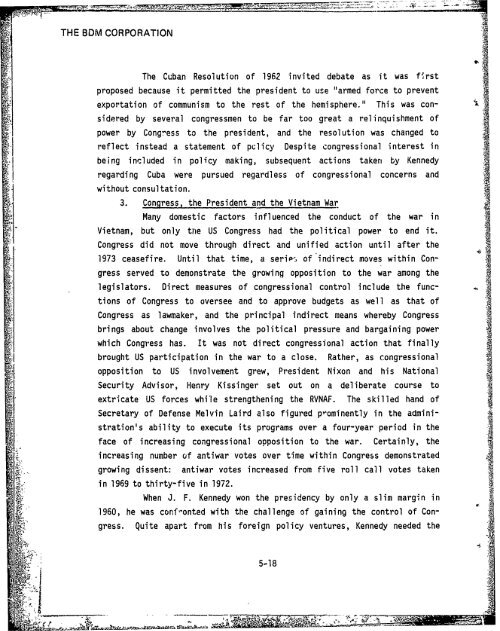policy - The Black Vault
policy - The Black Vault
policy - The Black Vault
Create successful ePaper yourself
Turn your PDF publications into a flip-book with our unique Google optimized e-Paper software.
THE BDM CORPORATION<br />
<strong>The</strong> Cuban Resolution of 1962 invited debate as it was first<br />
proposed because it permitted the president to use "armed force to prevent<br />
exportation of communism to the rest of the hemisphere." This was considered<br />
by several congressmen to be far too great a relinquishment of<br />
power by Congress to the president, and the resolution was changed to<br />
reflect instead a statement of <strong>policy</strong> Despite congressional interest in<br />
being included in <strong>policy</strong> making, subsequent actions taken by Kennedy<br />
regarding Cuba were pursued regardless of congressional concerns and<br />
without consultation.<br />
3. Congress, the President and the Vietnam War<br />
Many domestic factors influenced the conduct of the war in<br />
"Vietnam, but only the US Congress had the political power to end it.<br />
Congress did not move through direct and unified action until after the<br />
1973 ceasefire. Until that time, a seripe of indirect moves within Congress<br />
served to demonstrate the growing opposition to the war among the<br />
legislators. Direct measures of congressional control include the functions<br />
of Congress to oversee and to approve budgets as well as that of<br />
Congress as lawmaker, and the principal indirect means whereby Congress<br />
brings about change involves the political pressure and bargaining power<br />
which Congress has. It was not direct congressional action that finally<br />
brought US participation in the war to a close. Rather, as congressional<br />
opposition to US involvement grew, President Nixon and his National<br />
Security Advisor, Henry Kissinger set out on a deliberate course to<br />
extricate US forces while strengthening the RVNAF. <strong>The</strong> skilled hand of<br />
Secretary of Defense Melvin Laird also figured prominently in the administration's<br />
ability to execute its programs over a four-year period in the<br />
face of increasing congressional opposition to the war. Certainly, the<br />
increasing number of antiwar votes over time within Congress demonstrated<br />
growing dissent: antiwar votes increased from five roll call votes taken<br />
f v in 1969 to thirty-five in 1972.<br />
* When J. F. Kennedy won the presidency by only a slim margin in<br />
* 1960, he was conf,,onted with the challenge of gaining the control of Congress.<br />
Quite apart from his foreign <strong>policy</strong> ventures, Kennedy needed the<br />
5-18
















